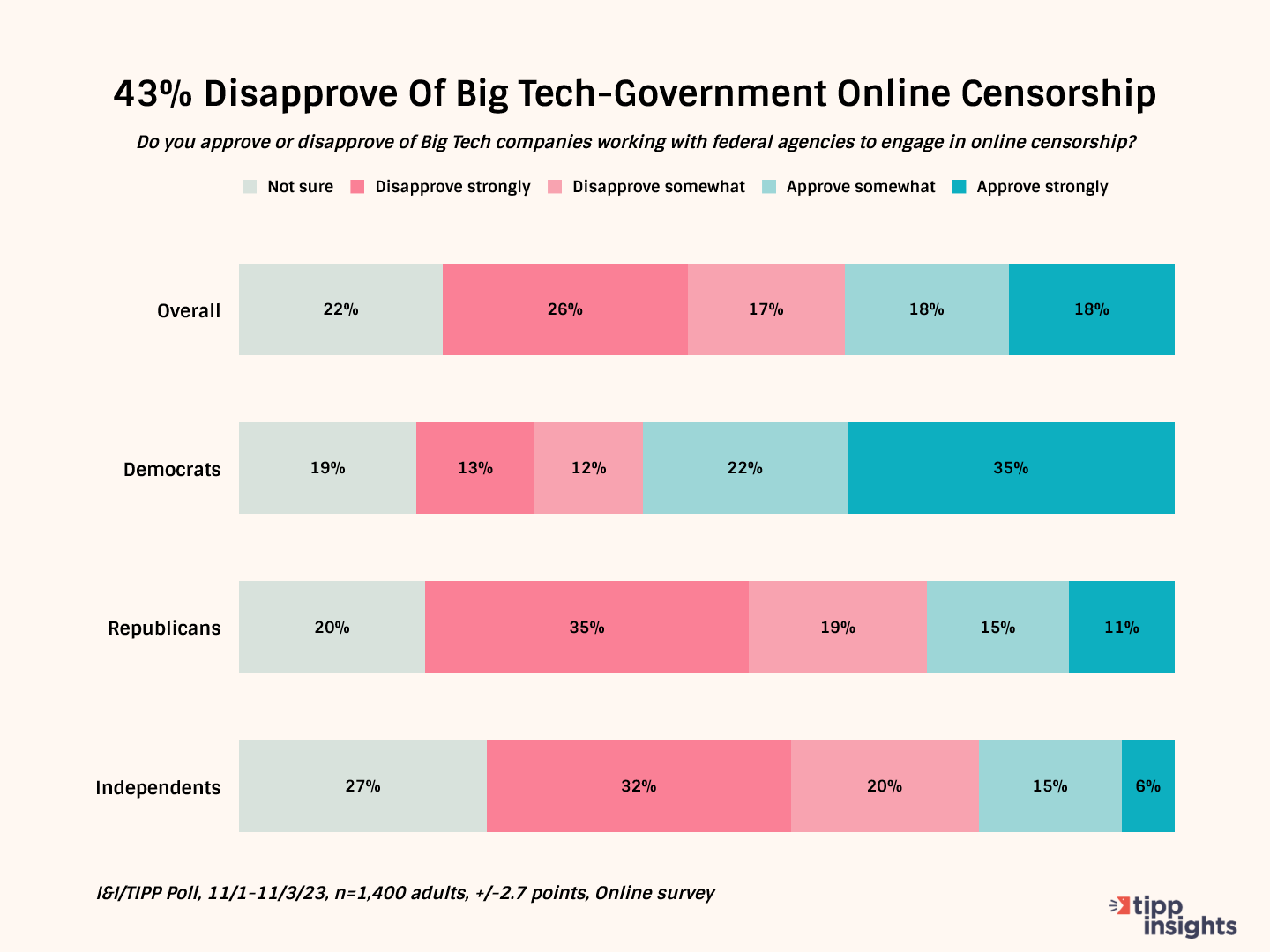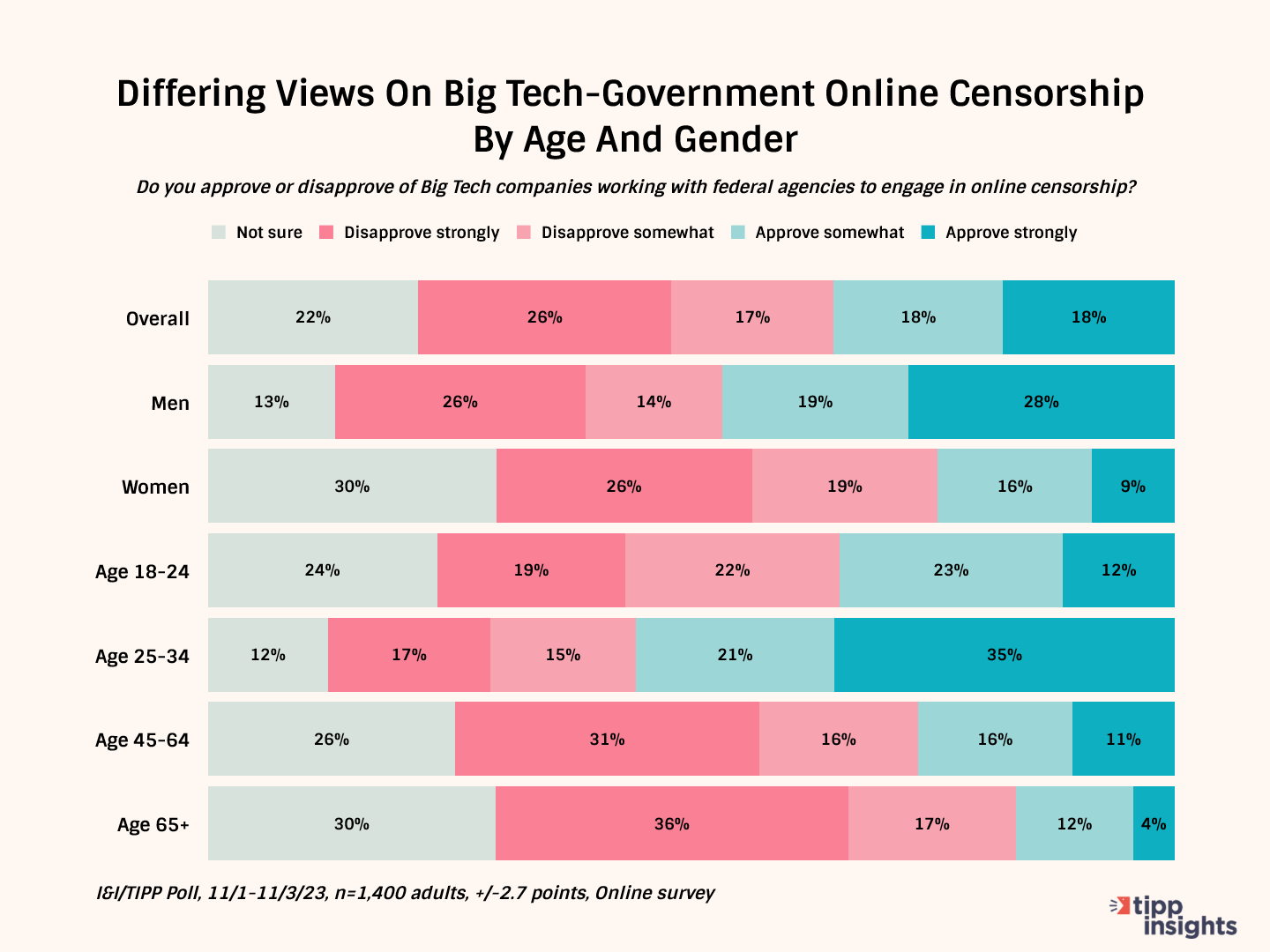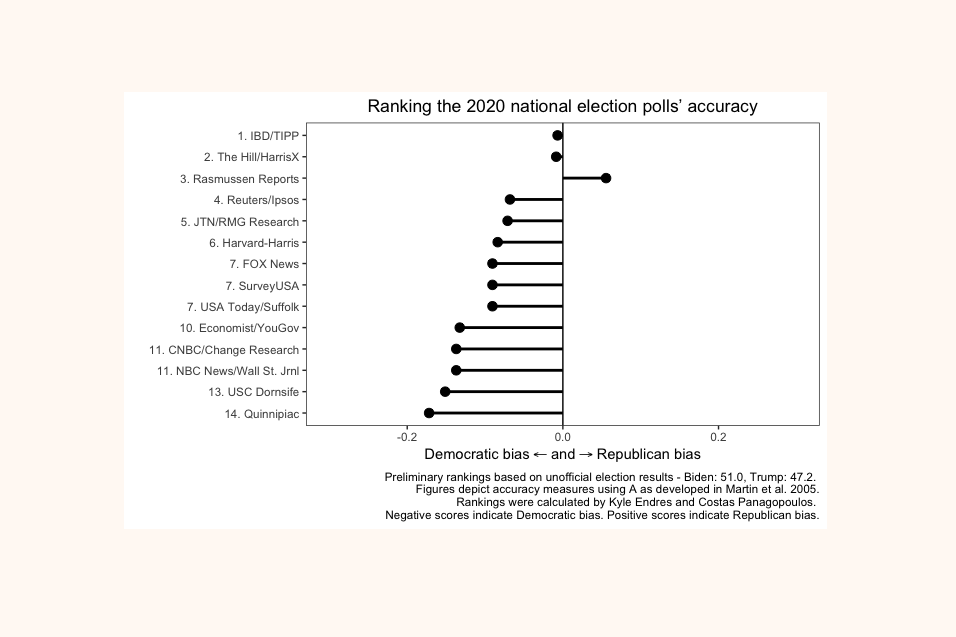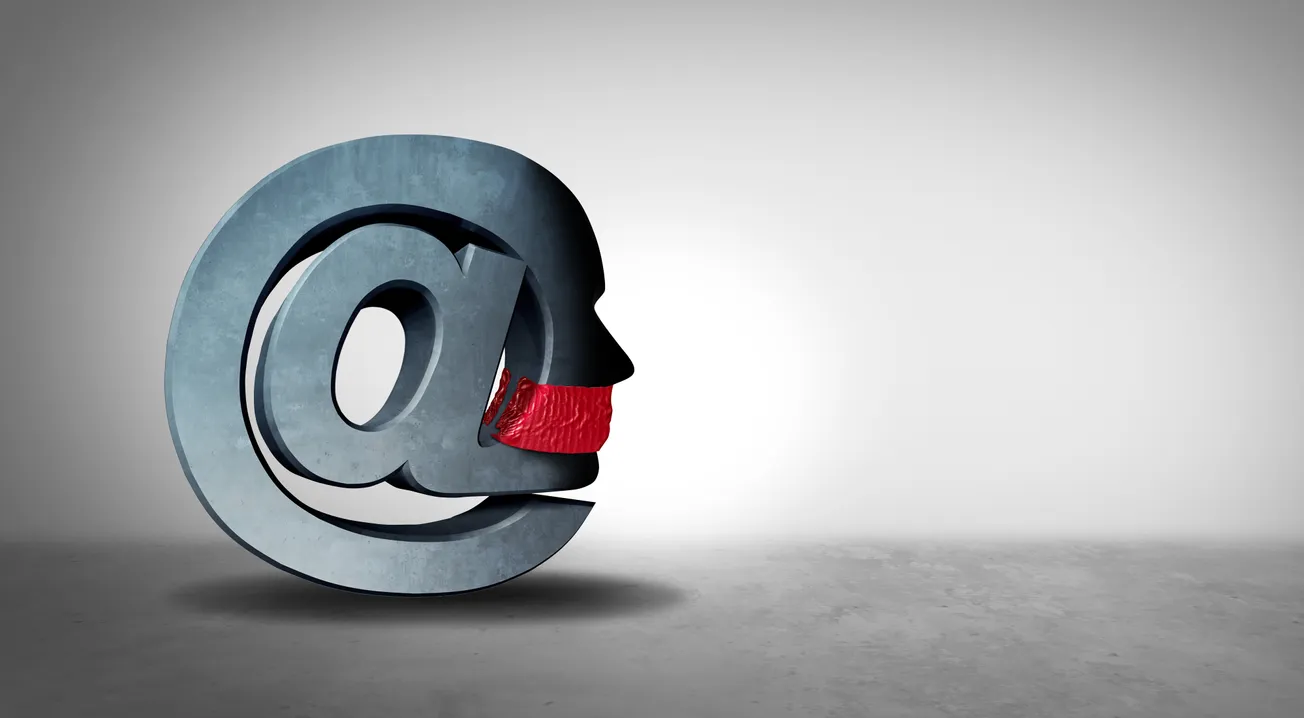Americans have come to realize that being online can mean having your speech rights curtailed. But that doesn't mean they like it. Indeed, they mostly oppose the idea, in particular when it's Big Tech and Big Government censoring together, according to the latest I&I/TIPP Poll.
With growing complaints over online censorship, the online national I&I/TIPP Poll, taken from Nov. 1-3, asked 1,400 respondents the following question: "Do you approve or disapprove of Big Tech companies working with federal agencies to engage in online censorship?"
For most people, the answer is negative. Of those who responded, 43% say they either disapproved of government and large tech and social media firms cooperating with each other to curb Americans' speech "strongly" (26%) or "somewhat" (17%).
By comparison, 36% say they approve of it "strongly" (18%) or "somewhat" (18%). A significantly large group, 22%, say they were "not sure."
The poll has a +/-2.7 percentage point margin of error.
But, the relative closeness of the response is deceptive. When broken down by demographics and political affiliation, surprisingly sharp differences between and within different groups emerge.
Start with politics. Democrats overwhelmingly approve of Big Tech and Big Government censoring online content, 57% "approve" to just 25% "disapprove."
Compare that with Republicans, who are almost exactly the opposite of the Dems in their response: 26% "approve," vs. 54% "disapprove." Similarly, independents "approve" by just 21%, while they "disapprove" by 52%. Republicans and independents are nearly identical, while Democrats are the outlier.

But those weren't the only stark differences.
Men and women see the issue quite differently, it seems. Men favor the government-Big Tech censorship alliance, with 47% approving, 40% disapproving. Women, not so much, with just 25% approving, with 46% disapproving.
The big difference? Just 13% of men say they were "not sure," compared with 30% of women.
Race is another big gap. White Americans are strongly anti-censorship, at just 27% approving, 49% disapproving and 24% unsure. Black and Hispanic Americans, meanwhile, are nearly the reverse, at 51% approval, 32% disapproval and 17% not sure.
Also surprising: Of the four broad age groups tracked by I&I/TIPP each month, only one strongly supports censorship: the 25-44 age group – 56% approve, only 32% disapprove. The other age groups broadly disapprove, including those ages 18-24 (35% approve, 41% disapprove), 45-64 (27% approve, 47% disapprove), and strongest of all, those 65-plus (16% approve, 53% disapprove).

Differences emerged, too, by region. The Northeast (38% approve, 39% disapprove) is basically break-even, as is the South (42% approve, 41% disapprove). But anti-censorship sentiment is strongest in the Midwest (23% approve, 51% disapprove) and the West (34% approve, 42% disapprove).
That the urge for censorship on the web comes from the political left, as the I&I/TIPP data suggest, is confirmed by recent revelations of government-social media efforts to tamp down "disinformation" starting even before the 2020 presidential election.
A report by RealClearInvestigations, for instance, shows that the Department of Homeland Security had "partnered" with Stanford Internet Observatory's so-called Election Integrity Partnership "to censor Americans' Constitutionally guaranteed right to free speech" during the 2020 election.
"HUNDREDS of secret reports show how @DHSgov’s @CISAgov, The GEC (@StateDept), @Stanford and others worked together to censor AMERICANS before the 2020 election, including true information, jokes, and opinions," Republican Rep. Jim Jordan tweeted earlier this month, following a report issued by the House Judiciary Committee, which he chairs.
But Stanford wasn't the only private party in the government's censorship efforts. Social media platforms themselves eagerly participated in censoring posts.
YouTube, Google, and Twitter have a history going back years of shutting down speech, censoring especially those on the conservative side of the national conversation. To do so, they employed legions of content monitors which eagerly scoured posts for "misinformation."
In addition to the government, a nascent censorship industry has emerged.
Most prominent is Newsguard, a for-profit company that RealClearInvestigations asserts "has built a business model out of broad labels that classify entire news sites as safe or untrustworthy, using an individual grading system producing what it calls 'nutrition labels.' "
But NewsGuard "has faced mounting criticism that rather than serving as a neutral public service against online propaganda, it instead acts as an opaque proxy for its government and corporate clients to stifle views that simply run counter to their own interests," RCI adds.
In short, there's now a government-big tech censorship complex, rapidly morphing into an industry.
And how did this urge to censor mostly "right-wing misinformation" come about? It mostly arose after Hillary Clinton lost the 2016 presidential election to Donald Trump and blamed it on conservative lies spread on the internet, influenced by the Russian government.
Clinton has since called for a "global reckoning" with "disinformation," and now blames Americans' "lack of appreciation" for President Joe Biden's accomplishments on a "lack of gatekeepers" and "misinformation." Not his unpopular policies.
For its part, the Biden administration has actively sought to censor online posts it doesn't like, setting off alarms over possible government abuse of Americans' First Amendment speech rights under the Constitution.
Earlier this month, entrepreneur Elon Musk described how the FBI, at the Department of Homeland Security's behest, worked with Twitter's former executives to control information on the platform before Musk bought the company in 2022 for $44 billion.
In an interview with podcast king Joe Rogan, Musk was blunt: "The degree to which Twitter was an arm of the government was not well understood by the people." He noted that before he took over, the ratio of conservative to leftist censorship on Twitter was roughly 10-to-1.
The political danger of a double standard for censorship is clear.
A recent example: The Chinese-controlled social media outlet TikTok allowed the inflammatory pro-terrorist apologia, "Bin Laden's Letter To America," to circulate freely, going viral among its Gen-Z readers before finally reacting. As a result, the now-deceased mastermind behind the 9/11 terrorist attacks has become a kind of counterculture hero to some who are too young to remember the horror of that day.
The urge to censor isn't limited to the online world. It's also part of what the City Journal recently called "The Tribal War Over Israel" now being waged in the media and on the streets. When two-time Pulitzer Prize-winning cartoonist Michael Ramirez of the Las Vegas Review-Journal drew a 'toon depicting senior Hamas official Ghazi Hamad and his human shields, his effort was absurdly canceled by the Washington Post for being "racist."

It seems clear that censorship, which "has become a global industry, worth billions of dollars," isn't going away any time soon. So it's likely here to stay, at least until 2024.
I&I/TIPP publishes timely, unique, and informative data each month on topics of public interest. TIPP’s reputation for polling excellence comes from being the most accurate pollster for the past five presidential elections.
Terry Jones is an editor of Issues & Insights. His four decades of journalism experience include serving as national issues editor, economics editor, and editorial page editor for Investor’s Business Daily.
Want to dig deeper? Download crosstabs from our store for a small fee!
We could use your help. Support our independent journalism with your paid subscription to keep our mission going.
Our performance in 2020 for accuracy as rated by Washington Post:










